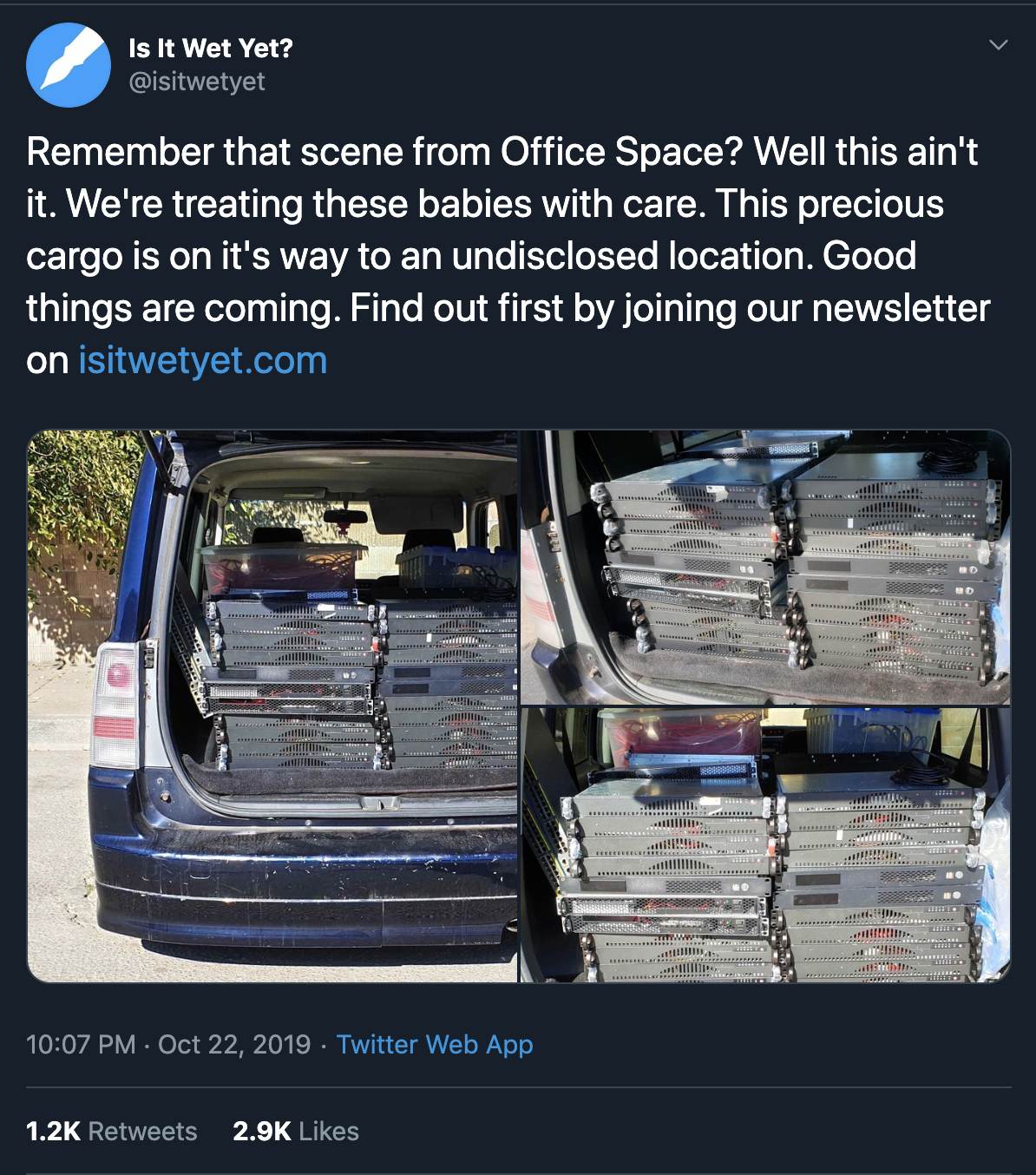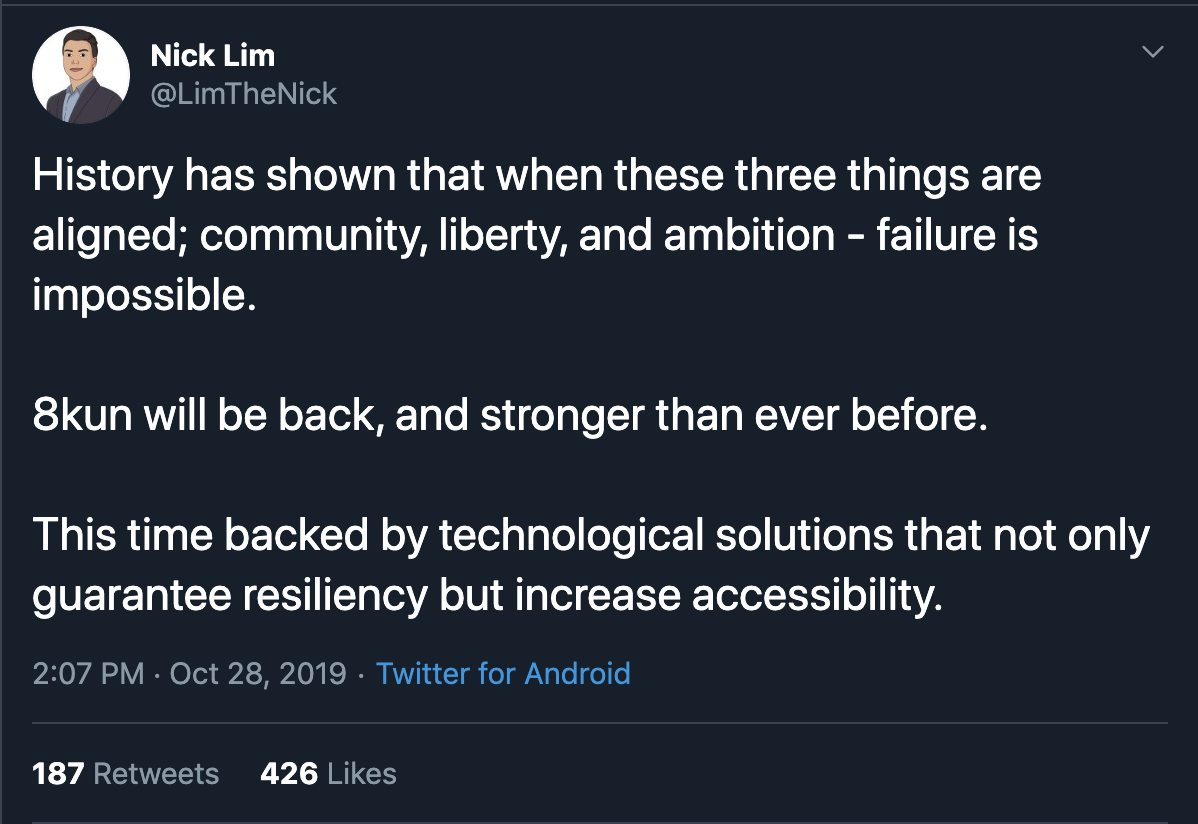The State of California Could Have Stopped 8Chan: It Didn’t
Reported with Fredrick Brennan
Over the course of 2019, the website “8chan” has directly inspired four acts of terrorism around the world, killing 76 people and wounding 80. The mass shootings in Christchurch, Poway, and El Paso are well-known. The mass shooting in Halle, Germany, which killed two and injured two more, received less attention. Since 8chan was dropped by its service providers and taken offline after the El Paso attack, the Halle shooter was unable to announce his killing spree there. Yet the connection was still obvious: the shooter’s attack was livestreamed, like the Christchurch shooting. He identified himself as “anon”, a general term for chan users.
The most direct connection between the Halle shooter and 8chan was hidden in the killer’s manifesto, in a joking reference he made to someone named Mark Mann. The shooter claimed Mann helped fund the attack. There is no evidence of this. But Mark Mann is an employee of NT Technology, an internet service provider owned by Jim Watkins, who also owns 8chan. Mann is Jewish, and the Halle shooter’s reference to him was almost certainly a cruel joke. The fact that Mann was referenced at all suggests the shooter was deeply familiar with the infamous image board.
8chan’s ability to continue inspiring attacks after its dissolution is disturbing. More worrying still is the fact that, over the last several months, Jim Watkins has waged a slow, grinding battle to bring the site back online. A number of volunteers, including 8chan’s former founder and the co-author of this article, Fredrick Brennan, have fought tooth and nail to stop him. But early in November the site, rebranded as “8kun”, came back online.
As I write this, 8kun has gone up and down for the past several days. It was dropped from its most recent host, a Russian ISP located two hours from North Korea, on November 3, 2019. It will come back online. If not via the normal web, than through peer-to-peer means like Tor. There was, however, a point at which the resurrection of 8chan could’ve been stopped — perhaps even forever. This is the story of why that did not happen.
The Stakes Involved
A discerning reader might ask: if the Halle shooting happened while 8chan was offline, does it really matter if it comes back up again? Will keeping it down reduce the number of shootings it helps to spawn?
There is no certain answer here, but there is evidence to suggest that yes, keeping 8chan offline is better for public safety. While the Halle shooting happened with 8chan offline, the shooter had presumably been a regular user of the image board for quite some time. It is reasonable to assume he was radicalized there. Since he went out of his way to copy several of the Christchurch shooter’s tactics, we can assume that manifesto had a significant impact on him.
In the wake of the Christchurch and Poway shootings, anons went out of their way to declare the killers “saints” and share their manifestos to every corner of the Internet. The Christchurch manifesto was even printed and sold on the streets of Ukraine. With 8chan down, there has been no similar concerted effort to spread the Halle shooter’s manifesto, nor the home-built firearm instructions he sought to make viral. 8chan’s /pol board was unique within the fascist media ecosystem; no comparable community of a similar size exists.
Outside of /pol, 8chan was also the host of the Q Research Board. It was the only place where the mysterious individual(s) known as “Q” could post and confirm his identity to his followers. With 8chan down, there were no Q drops for three months. During the brief time when “8kun” was online and functional, Q made four new drops, breathing life into the dangerous cult that exists around the conspiracy theories Q pushes. Qanon has already inspired a murder and a number of non-lethal attacks, including one on the Hoover Dam. In August of 2019, the FBI warned that conspiracy theories like Qanon encourage, “…the targeting of specific people, places and organizations, thereby increasing the risk of extremist violence against such targets.”
The Fight To Keep 8chan Offline
A number of journalists and activists, including me, have fought to keep 8chan in its grave. No one has put in more work than Fredrick Brennan. Since he is the man who founded and coded the website back in 2013, this is probably appropriate. The public face of this fight has been a social media campaign to name and shame the companies hosting and providing registration services to 8chan. This stopped the site from coming back online, but as long as Jim Watkins and his businesses own the servers 8chan’s data was stored on, they can continue their efforts to bring the site back, perhaps indefinitely.
Reporting by Mashable on August 5, 2019 identified Centauri Communications as the company that provided internet access to 8chan’s physical servers. In early September, 2019, Fredrick Brennan verified that Centauri’s servers were the second to last step on the traceroute for N.T. Technology, Jim Watkins’s company. Without Centauri, his business would not be online.
Centauri is one of the few businesses that have not yet been shamed out of working with Jim Watkins due to his association with 8chan. In September, Brennan was able to verify through the California Secretary of State’s website that the business was listed as “SOS/FTB Suspended”. According to the California Franchise Tax Board, this means Centauri is “…not in good standing and loses its rights, powers, and privileges to do business in California.”
On September 6, Brennan reached out to Asad Ramzanali, the Legislative Director for California State Representative Anna Eshoo. He started to explain the situation to Ramzanali, in the hopes that he could get Rep. Eshoo to reach out to the Franchise Tax Board and the Attorney General and do something to stop the return of 8chan, perhaps by seizing Centauri’s servers.
I’ve reviewed the chat logs between Ramzanali and Brennan. In them, Ramzanali appears engaged and helpful. Brennan informs him about one of the ways Watkins funds his operation, through PayPal donations to the website “jimisbad.com”. The PayPal link, which is still active, sends donated funds directly to N.T. Technology.
Ramzanali expressed concern, but pointed out that he and his boss could not take action if the website was not hosted in California.
Brennan was able to quickly show that “Jimisbad.com” is, in fact, hosted in California. Ramzanali expressed excitement, calling Brennan’s research “great stuff.”
Ramzanali set up a meeting with his boss, Rep. Eshoo, for Thursday, September 19. He told Brennan, “I’m pretty sure we’re going to get a final yes/no from my boss” after that. The meeting went well, and Ramzanali worked with Brennan to put together a letter from Rep. Eshoo to the California Secretary of State, Attorney General and State Controller. A copy of that letter is attached here in full. The letter officially requested the state “investigate two companies [Centauri and N.T.] operating in California despite lacking the proper authorizations to do so and take any legal actions you’re are [sic] authorized to take against these companies.”
The letter laid out the violent history of 8chan in a concise manner. It noted that both N.T. Technology and Centauri were “SOS/FTB Suspended” in the state, and that the vast majority of Centauri’s business came through N.T. Through the letter, Rep. Eshoo urged the recipients of her letter to “take the maximum possible actions you are authorized to take under California law against these companies.”
It was, in short, a good letter. But it was never sent.
When Courage Fails
One good marker of our absurd current era is the fact that elected officials now live in terror of nerds on an image board. On September 26, 2019, nearly three weeks after Ramzanali and Brennan began their correspondence, the former reached out to say that “bureaucratic issues” had delayed the approval of the letter.
By that point, it was already obvious that Jim Watkins planned to bring 8chan back under a new name. Ramzanali asked about this, and Brennan walked him through what he knew of the plans to bring 8chan back online. After this, Ramzanali finally explained the reason for the delay on approving the letter: Rep. Eshoo’s office was worried about being “Swatted.”
“Swatting” is what happens when a group of misanthropes on the Internet finds the address for someone they dislike and calls in a fake tip of a kidnapping or some other crime, in order to get a SWAT team sent to their victim’s home. This has resulted in deaths before. During Gamergate, members of 8chan attempted to SWAT video game critics. The fear that it might happen again is not misplaced.
On September 27, it became clear that 8chan would not be coming back online under its original name. There was confusion as to whether or not the new site “8kun”, might not actually host /pol at all. Rep. Eshoo’s office seems to have used this as an excuse to “hold off” on sending the letter:
The threat of swatting was mentioned again, and it seems likely that this fear was the main driving reason behind a lack of action. There is certainly a real danger here. But there is also danger in reporting on the violence spawned by 8chan.
I’ve received death threats as a result of my reporting on /pol. I continue to write about them. It is unsettling that an American member of Congress does not feel safe confronting these people, especially when the weaponized threat are the police, who presumably treat Congresspeople differently than they would, say, a random person of color or LGBT individual targeted by anons.
Brennan did not hear from Ramzanali, or anyone from Rep. Eshoo’s office, for more than three weeks. During this time, Watkins and his team escalated their efforts to bring 8chan back online. They cycled through a variety of hosts, including Alibaba Cloud and Zare, using fake names in order to try and slip through the cracks. “8kun” was only kept offline through the diligent work of worried volunteers.
On October 22, 2019, Ramzanali finally reached out to Brennan again:
He asked if 8kun was still being operated via Centauri, and hosted in the same data center in San Francisco. Brennan told him that, yes, it was, and once again begged Asad and Rep. Eshoo’s office to send the letter.
The last message Fredrick Brennan received from Ramzanali, or anyone else at Rep. Eshoo’s office, came two minutes later, at 6:44 PM Philippine Standard Time on October 22.
At 11:07 AM Philippines time the next day, roughly sixteen hours later, the Twitter account “Is It Wet Yet?”, which is operated by Watkins’s employees and exists to track the resurrection of 8chan, made this post:
The picture showed the 8chan servers (among other things) in the back of a car. Their current location is unknown. But 8kun’s new hosting company appears to be VanWaTech.
The CEO of VanWaTech is Nick Lim, the founder of BitMitigate, who briefly provided security services to 8chan after they were dropped by Cloudflare. BitMitigate was taken offline after its service provider objected to being associated with 8chan. On October 28, less than a week after 8chan’s servers were loaded into the trunk of that car, Nick Lim posted this:
Since Lim is based in Vancouver, Washington, and 8kun’s new host is named “VanWaTech”, there’s a good chance those servers were relocated somewhere in the vicinity of Vancouver. We can’t confirm that for certain at this time. All I can definitely say is that the State of California missed a potential opportunity to put this problem to rest.
We have reached out to Rep. Eshoo’s office for this story, but have not heard back as of press time. We will add any statements once they arrive.














